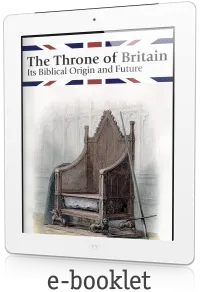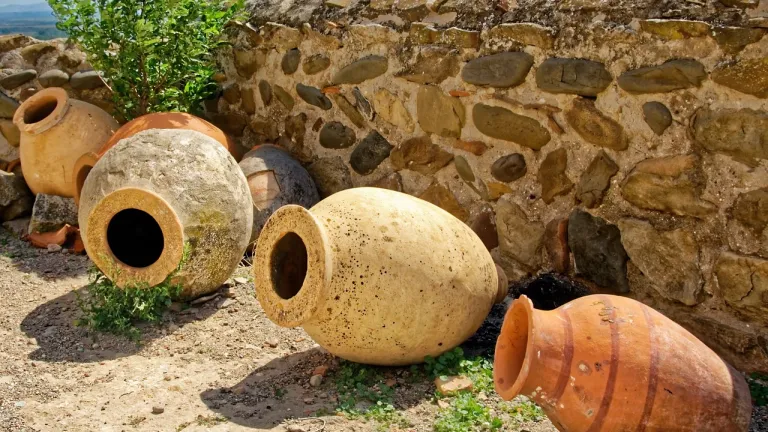Appendix 5: Brutus and the Covenant Land
What is the connection between Brutus and the Covenant land?
One king of Trojan descent of whom we have record was mentioned at the outset of this publication—Brutus or Brwt, the first king of Britain, from whom Britain is understood to have derived its name. Notice the following from an old British history published in 1661:
"In the time of King Edward I [1272-1307]. At Lincolne, where [was] held a Parliament, after much diligent search of antiquities . . . letters were sent to the Pope of Rome, sealed with an hundred seals and witnesses . . . wherein is declared and justified that in the time of Hely [Eli] and Samuel the Prophet [that is, ca. 1100 B.C.], Brutus a Trojan landed here, and by his own name called the Country Britannia, before named Albion" (Percy Enderbie, Cambria Triumphans, or Britain in Its Perfect Luster).
The account goes on to describe how the nation was divided between his sons into three parts—Loegria, Albania and Cambria (later known as England, Scotland and Wales respectively). This was likely derived in part from the record set down by Geoffrey of Monmouth in the 1100s in his History of the Kings of Britain, which many scholars now prefer to dismiss as fiction. (It may be downloaded from www.yorku.ca/inpar/geoffrey_thompson.pdf.). However, Geoffrey claims that he was translating from a much older source in the early British language. And there is evidence to support his claim and work (see Mike Gascoigne, "Why All the Fuss About Geoffrey?," on-line at www.write-on.co.uk/history/geoffrey.htm and Bill Cooper, "The Kings of the Ancient Britons: A Chronology," on-line at www.biblebelievers.org.au/nation08.htm).
Furthermore, 300 years before Geoffrey the Welsh monk Nennius had also recorded the coming of Brutus in his History of the Britons (on-line at users.ev1.net/~theweb/Nennius.htm)—explaining him to be descended from Aeneas of the Trojan royal house, the same Aeneas from whom the early Roman emperors claimed descent, and how Brutus subdued Spain and journeyed through Gaul before arriving in Britain. Indeed, others had recorded elements of this tale as well. And there was much tradition surrounding it, such as Brutus coming upon other Trojan colonies in Spain and Gaul and persuading them to join him in his journey north.
Tradition further states that Brutus and his entourage arrived in Devon in southwest England, sailing up the River Dart past modern Dartmouth—putting in 12 miles inland from Torbay at what is now Totnes, a town of ancient pedigree. The Brutus Stone in Fore Street there still marks the spot where he is supposed to have stepped ashore. Is it conceivable that the River Dart, along with the surrounding countryside of Dartmoor, was actually named after the heir of Darda, founder of the house of Troy? The Dart might seem to have been named after the Celtic tribe of Durotriges who lived in the area, although perhaps the reverse is true—they being named after the river and countryside, which itself was named after Darda.
Brutus is further credited with the founding of London as Trinovantum or New Troy (see Gascoigne, "The Trojan City of London," on-line at www.write-on.co.uk/history/trojan_london.htm). One author comments: "No longer need the story be regarded as fabulous, that Brutus the Trojan, the grandson of Aeneas (the hero of Virgil’s great epic), gave the name of Caer Troia, Troynovant or New Troy, to London. In site and surroundings . . . there seems to have been considerable resemblance between the historic Troy on the Scamander and New Troy on the Thames. On the plains of Troy today may be seen numerous conical mounds rising from out of the lagoons and swamps that environed the citadel hill of Hissarlik [the modern site of ancient Troy in northwest Turkey], akin to those that dominate the marshes, round about the Caer and Porth of London, in prehistoric times" (E.O. Gordon, Prehistoric London: Its Mounds and Circles, 1946, p. 83).
Modern history identifies the Trinovantes as an ancient Celtic tribe dwelling not far to the north of London at the time of the Roman conquest of Britain. Julius Caesar mentioned them in his writings. They may have derived their name from Brutus’ capital. According to Bede’s History of the English Church and People, completed in 731, "the strong city of Trinovantum and its commander Androgius surrendered to Caesar" (Book 1, chap. 2, translated by Leo Sherley-Price, 1955).
Not surprisingly, the majority of scholars today reject the story of Brutus as having any bearing on the etymology of the name Britain. According to them, the Britons are named after one of the two major branches of the early Celts in the British Isles. One branch was that of the Goidelic Celts, from whom the Gaels of Ireland and Scotland trace their ancestry. The other was that of the Brythonic or Brittonic Celts, from whom the peoples of Wales and Brittany are descended.
But could not the Brythonic Celts have been named after Brwt or Brutus? After all, the word Brython or Brwth-ayn, from which Britain came, is simply Brwt (pronounced Brutt or Britt) with the Celtic augmentative or plural suffix. As the Celtic language very likely developed out of the ancient Hebrew language (the Celts being descendants of the Israelites), we might wonder what Brit means in Hebrew. Stunningly, this is how to pronounce the Hebrew word for "covenant." The Israelites were the people of the covenant (compare Exodus 19:5). The word b’rit (or berith) could be made part of a name—as it is in that of the false god Baal-Berith (see Judges 8:33; 9:4). Britain, then, would essentially mean place or land of the covenant—or, perhaps, of the covenant people. Indeed, the term "covenant people" in Hebrew would be Brit-am, which is rather close to Britain.
It is entirely possible, of course, that Brutus himself was given the Hebrew name Brit (later Latinized as Brutus). After all, he was of Jewish descent through the house of Troy. So he could have received a Hebrew name. Of course it is also possible that he was historically nameless—referred to simply as king of the Brwt, a name that was then applied to him personally.
However it happened, it is remarkable that a name meaning "covenant" in Hebrew came to refer to a nation of Israelite descent. Indeed, Britain—primarily descended from Joseph’s son Ephraim—is the leading nation of Israel. Perhaps it is only a coincidence that the English word "British" can be broken down in Hebrew as "covenant man" (ish being a familiar suffix in English meaning "pertaining to" but a word meaning "man" in Hebrew). Or perhaps it is no coincidence at all.
Quite interesting in this regard is a statement in an audio study course called An Invitation to Hebrew in its section on the "Vocabulary of Jewish Life." After the teacher confirms that "covenant in Hebrew is . . . b’rit," he mentions its occurrence in the term "b’nai b’rit, the children of the covenant" and in referring to "the USA, which is called, in Hebrew, Artzot Ha-Brit, the lands of the covenant" (Mordecai Kamrat, Spoken Arts, Inc., 1960).
This is all rather astonishing. For both the United States and Britain are indeed the lands of the covenant—the lands God promised to the descendants of Abraham, Isaac and Jacob by covenant. For help in studying this subject in greater detail, request or download your free copy of The United States and Britain in Bible Prophecy.




